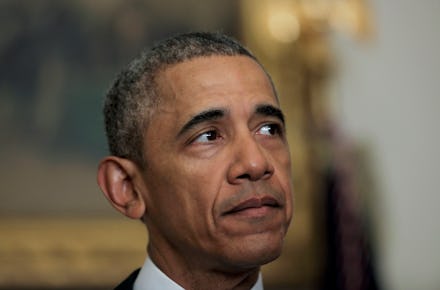Obama's Looking to Take a Huge Step Against Money in Politics — Without Congress

Resigned to the fact that Washington is a place where cooperation is an impossibility, President Barack Obama is again wielding a weapon that he's become familiar with during the closing chapter of his presidency: executive actions. This time, he's taking aim at money in politics.
On Wednesday, the New York Times reported that the Obama administration is seriously considering executive actions that would force contractors with the federal government to disclose their political contributions. The administration hopes that doing so would compel corporations who do business with the government to rethink how they exercise political influence.
There is no exact timeline for the "dark money" executive order, but the Times noted that talk of the order has grown louder both in and outside of the White House in recent weeks, and Obama's penchant for crafting policy outside of the conventional legislative process only appears to be growing.
Should Obama institute the proposed rules, the flow of campaign cash coming from federal contractors, which has drastically increased since the Citizens United Supreme Court ruling in 2010, would suddenly be thrust into public view. Citizens United made it legal for corporations and unions to pour unlimited sums of money into independent efforts to shape election outcomes.
"This executive order would begin turning President Obama's powerful words from the State of the Union into concrete action," Adam Smith, communicators director at campaign finance reform group Every Voice, told Mic. "It would be an important step toward revealing some of the money from 'hidden interests' he mentioned in the speech."
Unsurprisingly, big business interests are terrified at the prospect.
Dark money: Since 2010, groups have spent over half a billion dollars of "dark money" in federal elections, according to a 2015 report from the Brennan Center for Justice. Dark money refers to funds that have cycled through a shadowy network of special nonprofits that have free rein to spend unlimited amounts of money on political advertising on behalf of anyone, including corporations, without disclosing their donors.
Requiring disclosure of political spending by government contractors would help undermine that network. A rule for government contractors would only cover a portion of the business world, but it would be a crucial one. Public Citizen, a progressive advocacy outfit, estimated in 2015 that the executive order would cover at least 70% of Fortune 100 companies, including behemoths like Exxon Mobil Corp., General Motors, Bank of America and Boeing.
"Because the federal government buys everything from toothbrushes to nuclear missiles, it is no surprise that most large companies are significant government contractors," Robert Weissman, president of Public Citizen, said last April in a statement. "What we don't know, thanks to the use of dark money, is exactly what these companies are spending on the political process, including for the potential purpose of influencing government contracting decisions."
The takeaway: If Obama goes ahead with the dark money executive order, it won't do anything to stop the flow of money from major corporations into the political sphere. But it would be vital step in allowing the public to have a better understanding of who is doing things like funding the political advertisements convincing them the U.S. needs to be more militarily involved in the Middle East.
Knowing that such a message is coming from a group of veterans tells you one thing about the message, and knowing it's coming from an oil company hints at another. In American politics, it's always essential to follow the money.